Press Archives
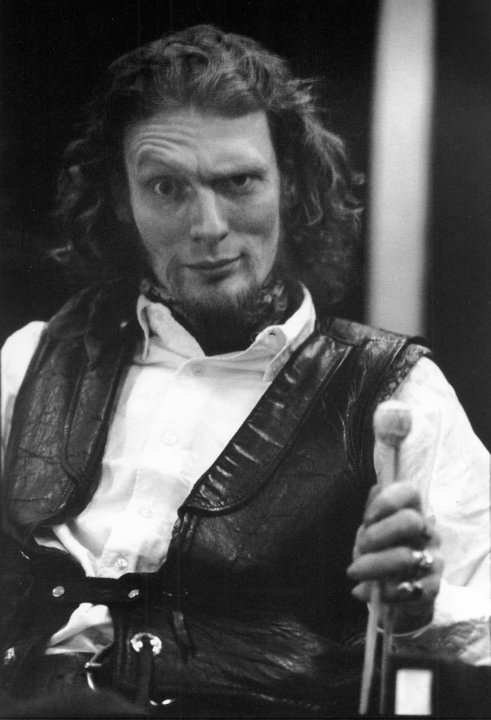
Press 1975
Baker Plays Polo
London Evening News
GAD, SIR... it's enough to make you choke on your pink gin! Dukes, earls and princes are being pushed to one side as rock stars have taken up polo... the traditional sport of kings. Drummer Ginger Baker who used to play with Cream, Kenny Jones of The Faces and Brian Morrison, the former manager of the Pink Floyd, T. Rex and Free, are all dedicated members of the exclusive Ham Polo Club in Surrey. "It's the fastest, most exciting sport in the world," Ginger-who owns four polo ponies-tells me.
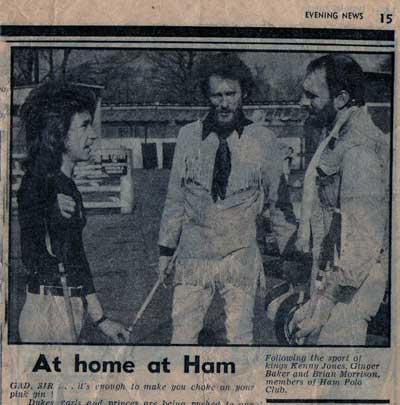
What ever happened to Ginger Baker?
By Judith Simons
GINGER Baker is acknowledged to be the best drummer in the world a description with which he agrees. "There aren’t many drummers who can get anywhere near me." he says with a smile.
This Viking-like, 35- year-old South Londoner, tall and lithe, with a spiky ginger beard, is proud of his skill and dazzling evidence of the riches it has brought him is abundantly displayed at his home at Harrow, Middlesex.
There, in the square entrance hall are gold and platinum discs, certifying sales of £20 million worth of records for his groups Cream and Blind Faith.
Ginger’s own share was around £2 million earned, at one stage, at the rate of £23,000 a night for appearances in America.
With such wealth in his fast fingers he has freedom to choose his own life style. He has made only one concert tour in four years — with an African band called Salt — and has spent most of his time in Nigeria, where he has invested £150,000 building and equipping a recording studio.
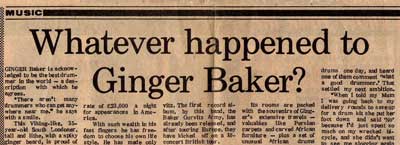
Now Ginger (real name Peter) is back on the road again, enthusiasm for playing refreshed, with new partners — guitarist brothers Adrian and Paul Gurvitz. The first record album, by this band, the Baker Gurvitz Army, has already been released, and after touring Europe, they have kicked off on a 10-concert British tour.
Considering Ginger’s status in that most pressured area of music — the complicated rock-jazz scene — his outlook is remarkably solid.
He, his wife Liz and their three children — Ginette Karen, 14, Leda Kirsten, six, and Kofi Streatfield five — live in a detached house bought seven years ago for £10,000 and now worth £40,000.
Its rooms are packed with the souvenirs of Ginger’s extensive travels — valuables like Persian carpets and carved African furniture — plus a set of unusual African drums which Ginger plays only to amuse his children. He also owns five motor vehicles ranging from two Jensens to a five-ton truck.
As he has never abandoned his youthful ambition to be an artist, his home is also enhanced by his own abstract sculpture.
Speed and rhythm, mechanical or that of his own hands,has been a gift that has been with Ginger since childhood.
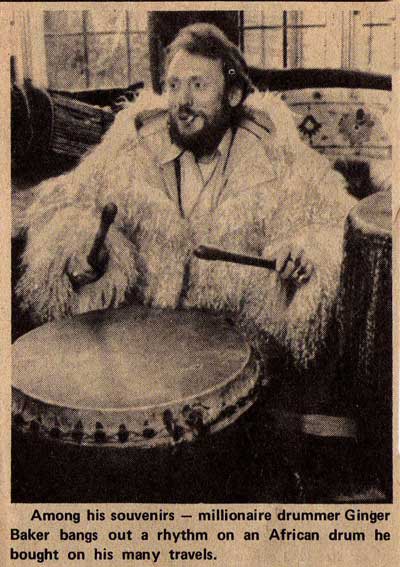
His whole career emerged accidentally from the wreckage of his first love — a bicycle.
He told me: "When I was at Shooters Hill Grammar School I made up my mind to be a racing cyclist. I worked on a paper round, baker’s round and milk round to save up for my bike, and then my whole ambition collapsed when I collided with a taxi and my bike was completely wrecked.
With time on my hands I started visiting some friends who had a little band. I sat in on the drums one day, and heard one of them comment ‘What a good drummer'. That settled my next ambition.
When I told my Mum I was going back to my delivery rounds to save up for a drum kit she put her foot down and said ‘No’ because I’d just spent so much on my wrecked bicycle, and she didn’t want to see me slogging again for something that would come to nothing.
"Strangely, she made more fuss then than when I announced a couple of years later that I’d given up my job in an art studio, had got a flat in town and was leaving home to make my way as a drummer.
"The only time after that when we clashed at all was during my one spell out of work, when I was 18. I stayed at home practising the drums night and days. I nearly drove them insane."
By this stage of his life Ginger had met Liz. She took up their story.
"I was out with a boy friend and he said: ‘Just go up to the band and watch Ginger Baker playing.'
"It seems that Ginger also watched me. Because I saw him on the Tube next day and he spoke to me. Our romance flourished on the Bakerloo Line. He went off to play in Copenhagen and came back with an engagement ring. We married when we were both 19".
By that time Ginger’s career was beginning to sweep him upwards.
"I made my first record in 1957 with Acker Bilk. I played with Terry Lightfoot, Alexis Korner, Harold McNair, Diz Disley, the Graham Bond Organisation. I made my first real money through selling a composition to The Who for £1500. That bought me my first car.
"I also worked for a time with an Irish dance band in Kilburn — a vital step, because I learned to read music and play every percussion instrument.
"That turned me from a natural talent into a real musician. Many jazz and pop players have natural talent, but to be a first class musician you need to study theory too.
"For me it is easy. Of course I have a gift, I am ambidextrous and have remarkable co-ordination... so much so that my favourite party trick is falling down a flight of stairs, on a chair, backwards without hurting myself or doing any damage."
It was In 1966 that Ginger’s abilities began to reach their peak earning power; he teamed with guitarists Eric Clapton and Jack Bruce to form Cream. It was the first so-called "Super Group".
We became so popular we could go on stage and play badly, but still go down well with the audience. That was disheartening and frustrating.
"Though the three of us are close friends — like brothers and always will be — we started clashing. In 1970 we split. Eric and I formed Blind Faith with Steve Winwood and Rick Grech. But though still wildly successful it lasted only a few months.
After that I formed Air Force — 10 musicians and not a money-making pro. position, because we were badly organised.
“After that I changed my life altogether. Being a drummer I had always wanted to go to Africa. I had also wanted for years to build a recording studio.
"What helped me decide to build it in Nigeria was the reception I got when I arrived in Lagos for a holiday. The army was at the airport to welcome me, and it seemed everyone in the streets knew who I was.
"The business side of things was viable. We started properly, by buying the land. By January 1973 we were in full swing. Already one world hit has been recorded there — ‘Band on the Run’ by McCartney’s Wings."
It says much for Ginger's strength of character that he has survived the chief danger of his trade — drugs — without wrecking his family life or career.
He said: "I have been through all that, and for me it is now finished. When I was an up-coming musician everyone I dug was involved in, and like other youngsters around I thought it was the done thing— so I did it too.
"The biggest, most sobering disappointment of my life was actually getting a job with John Dankworth — and then being turned away by him when he found out I was a junkie.
"I have seen friends of mine die through drug-taking. And today I have no sympathy for anyone involved in that scene. Drug-taking musicians who achieved greatness have done so despite the habit, not because of it.
"If you need kicks and life-line there are other ways to get them. I get stability from my family. You can’t be on drug trips with young children watching you. As I wrote in one of my new songs, the look in the children’s eyes made me realise I was going wrong."
Though he claims he is a "male chauvinist pig" he is obviously happy to be married to a strong partner.
Ginger is pleased about his wife’s spirit. "She gets wild when she’s pregnant. Once, at a concert she laid a bouncer out cold."
Press 1974
Ginger—off to drum up business in the Sahara
by Judith Simons
GINGER BAKER, the South Londoner acknowledged to be the world’s top pop drummer, is about to embark on a different type of project, combining adventure with business enterprise.
As a partner in the newly formed Trans-Sahara Trucking Corporation, he will be scout for the largest convoy of laden vehicles ever to cross the Sahara Desert from Algiers to Lagos, Nigeria.
The convoy, with its cargo of industrial equipment ranging from the parts and bearings, will start on its 2,500-mile, 12-day journey on Friday.
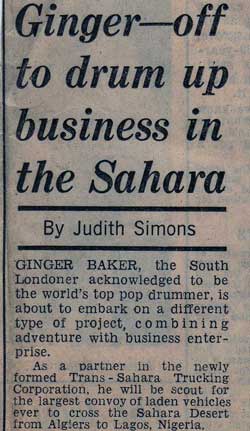
That’s the day after Baker finishes three equally strenuous weeks’ engagements in Germany with his band the Baker-Gurvitz Army. Baker 36, became interested in Nigerian development when he first visited the country five years ago.
Largest
At a garage near Watford, Herts, as he checked his Range Rover for the journey, Baker, who has crossed the Sahara many times, said: “With its 82 million population Nigeria is the largest and fastest developing country in black Africa.
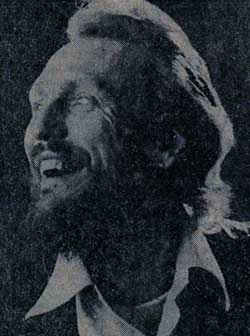

“At the moment the docks there are not big enough to accommodate all the ships bringing deliveries, even though a new harbour is under construction. Since I launched my project to relieve this imports bottleneck, I have had inquiries from 400 British firms wanting me to take their goods to Nigeria.
“On their return journey the convoy will be exporting Nigerian goods to Europe, including wood.”
Ginger will fly back to Britain from Lagos for a three-month tour with his band, starting next month. But he said: “I am already getting a bit old to be a pop star. Music is what has made all my other enterprises possible, but I am not going to be able to play music for the rest of my working life.
“Drumming is a very physical thing and one needs to be pretty fit. I am at my peak, but once one is past 40 one begins to slow down. In four years or so I hope to have other work interests-including the trekking company.”
Press 1972
SALT AND GINGER
TONY AMADI reports from Lagos, Nigeria on Ginger Baker’s latest exploits.
MELODY MAKER, July 15, 1972
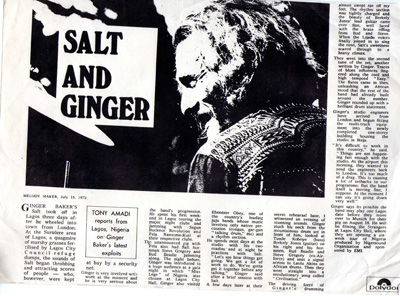
Ginger Baker's Salt took off in Lagos three days after he wheeled into town from London. At the Surulere area of Lagos, a quagmire of marshy grasses fertilised by Lagos City Council refuge dumps, the sounds of Salt began throbbing and attracting scores of people — who, however, were kept at bay by a security net.
Ginger is very involved with work at the moment and he is very serious about the band’s progression. He spent his first weekend in Lagos touring the major night clubs and jamming with Segun Bucknor Revolution and Fela Ransome-Kuti at their respective clubs.
The unannounced gig with Fela also had salt hornman Steve Gregory and Bud Beadle jamming along. The night before, Ginger was introduced to a huge audience at a gala night in which “Miss Legs” of Nieria was chosen at Lagos City Hall, Ginger also visited Ebenezer Obey, one of the country’s leading juju bands whose music involves only native percussion (congas, gar-gan “talking drum,’ etc) and a rhythm section.
He spends most days at the studio with his two roadies and at night he practices with Salt. “Let’s see how things get going. We got a lot of work to do. Weve gotta get it together before any talking,” Ginger said after a brief session with Salt.
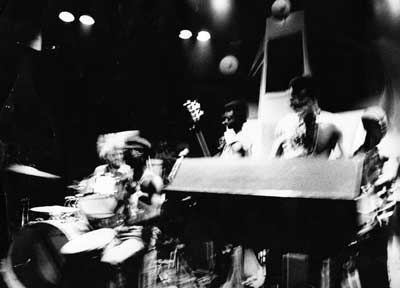
A few days later at their secret rehearsal base, I witnessed an evening of stunning sounds. Ginger stuck his neck from the mountainous drum set in front of him, looked at Tunde Koboye (bass) Berkely Jones (guitar) on his right and his hornmen, Bud Beadle and Steve Gregory (ex-Airforce) and sent a signal across to Laolu Akins on African drums. Then they went straight into a revolutionary song called “ Civilisation.”
The driving force of Ginger’s drumming almost swept me off my feet. The rhythm section was tightly charged and the beauty of Berkely Jones’ lead guitar came over fine, well laced with the brass rifling from Bud and Steve. When the Lijadu voices finally joined in to sing the tune, Salt’s sweetness soared through to a heavy climax.
They went into the second tune of the set, another written by Ginger. Traces of blues influences lingered along the cool and high tempoed "Easy.” The flutes came in then, unleashing an African mood that the rest of the band had already built around the number. Ginger rounded up with a brilliant drum statement.
Ginger’s studio engineers have arrived from London and begun fitting the multi-track equipment into the newly completed one-storey building housing the studio in Ikeja.
“Its difficult to work in this country,” he said. Things are not happening fast enough with the studio. At the airport this morning, they wanted to send the engineers back to London. It’s too much of a drag. This is causing a lot of setbacks to our programme. But the band itself is moving fine, I suppose. At the moment can say it’s going down very well.”
Ginger says its possible the band may play one Lagos date before they move over to Munich for their gig on August 18. He will be filming the Strangers at Lagos City Hall, where they are opening a six- week tour of Nigeria produced by Nigersound Organisation and sponsored by EMI.
BAKER LASHES OUT
In defence of CreamNew Musical Express, February 5, 1972
In NMEs London edition last week Tony Tyler drew comparisons between Mountain and Cream. He also unfavourably compared Ginger Baker with Corky Laing. Baker lashes back.
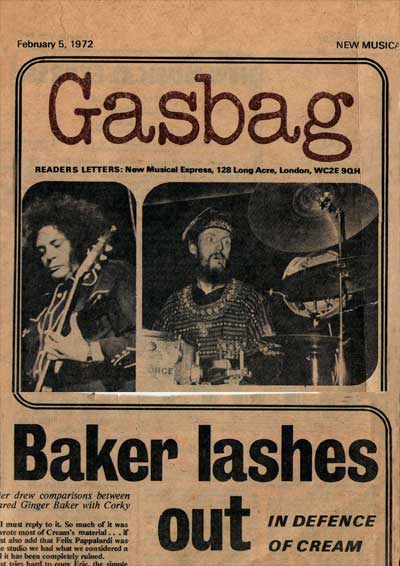
I FEEL that after reading your ridiculous article on Mountain, I must reply to it. So much of it was incorrect as to be laughable. You state that Felix Pappalardi co-wrote most of Cream’s material... if you check your records you will find that this is untrue. You must also add that Felix Pappalardi was highly responsible for the break-up of Cream. Often on leaving the studio we had what we considered a good mix — only to find that when the record was finally released it has been completely ruined.
Eric Clapton has NEVER abdicated any crown. Though West tries hard to copy Eric, the simple fact that he does not play West negates any soul that may have been there.
No group will ever go anywhere near Cream because the main thing with Cream was the improvisation by three excellent musicians playing themselves. It seems a shame that Mountain try to achieve acclaim by mentioning Cream in every single article. — GINGER BAKER, W. 1.
Press 1971
How Cream went sour
Will Cream ever re-form? "No" says the man who founded the group way back in 1966 - Ginger Baker.
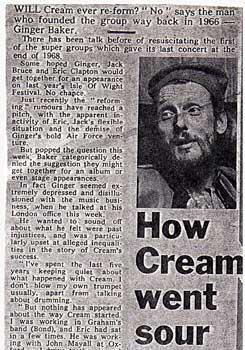
There has been talk before of resuscitating the first of the super groups which gave its last concert at the end of 1968.
Some hoped Ginger, Jack Bruce and Eric Clapton would get together for an appearance on last year’s Isle Of Wight Festival. No chance.
Just recently the “reforming” rumours have reached a pitch, with the apparent inactivity of Eric, Jack’s flexible situation and the demise of Ginger’s bold Air Force venture.
But popped the question this week, Baker categorically denied the suggestion they might get together for an album or even stage appearances.
In fact Ginger seemed extremely depressed and disillusioned with the music business, when he talked at his London office this week.
He wanted to sound off about what he felt were past injustices, and was particularly upset at alleged inequalities in the story of Cream’s success.
“I’ve spent the last five years keeping quiet about what happened with Cream. I don’t blow my own trumpet usually, apart from talking about drumming.
“But nothing has appeared about the way Cream started. I was working in Graham’s band (Bond), and Eric had sat in a few times.
He was working with John Mayall at Oxtord — I drove to the gig and after sitting in, asked Eric if he would be prepared to joIn a new band I was forming. He agreed and suggested we get Jack. I had every reason to say ‘No’ as I had fired him from Bond’s band six months before. But I agreed.
"Eric, through John Mayall, was involved with Rik Gunnell and Rik tried to convince me that he should manage the group. I convinced Eric and Jack that the Robert Stigwood Organisation should do this.
All the Cream’s bookings were supervised by Robert Masters and myself... I would like to point out that I took a cut in my earnings of £20 per week at the start of Cream. Origina]y the idea was that it was to be my band. I knew it would be successful. Jack and Eric wanted it cooperative. I said then the writing should also be shared as I was getting nothing extra for the work I was doing. But Jack ad Eric said, 'No, whoever did the writing should get the royalties.’
After three months I was dissatisfied with the situation. They wouldn't even try many of the Songs I had written. I was informed they were getting a new drummer. Why they didn’t, I don’t know. But it was just as well they didn’t.
"The seeds of break-up were there from the beginning. Many times I had to drink myself into a stupor before I could work with them. I asked Peter Brown if he wou]d help us with lyrics at Klooks Kleek club in London, our second gig. Now I’m not prepared to work with any of them again under any circumstances. Two of the Cream numbers which I had a large part of the writing, I got no credits, and therefore no royalties.
It wasn’t just through money that Cream broke up. I did well myself, and because I've got my head screwed on, I’m still okay. Recently it was put to me that it would be a good idea to get Cream together again. I said I would do it if it was done in the right way. Nothing was to be said in public until agreement was reached, but right away it was stated Cream was to reform.
The break-up of Air Force was a complete disappointment. It could have been great, but I didn’t get much support. We didn’t get to the States. A lot people there wanted to hear me play.
Since that and the Cream disaster, I'll never feel quite the same. I gave everything I had to them. I can’t really get too enthusiastic about anything now.
"I'm thinking of getting my own band together to do one final album, then I will knock the whole business on the head. I'm getting too old to be mucked about. I’ve had so many disappointments and bring downs. Not from the public — they have always been great to me."
While past problems would prevent the three ever reuniting unless there was some kind of miracle, the three men are bringing talent to bear on new solo projects.
Eric wants to do a new Dominos album, Jack has completed a tremendous follow-up to his ’Songs For A Tailor,” and Ginger has an exciting new single release.
Called "Atunde" (We Are Here). It is probably one of his best recordings featuring an African drum choir, so unusual it could easily become a chart success.
CHRIS WELCH
Except from Hellraiser, chapter 17, 1971
I had planned to do some recording with Fela Ransome-Kuti, and EMI’s Nigerian managing director Mike Wells thought it was a great idea. I would do an album with his Africa 70 band and Fela would play on one of mine. An audience of 150 crammed into a large studio at Abbey Road with coloured spotlights dancing about the walls to give it the feel of a proper live gig.
Fela Ransome-Kuti and Africa 70 with Ginger Baker: Live! was recorded in just a few hours and I’m still very proud of it ‘Ye Ye De Smell’ was written by Fela and referred to some incidents involving chicks that we had shared.
It featured drum solos by Tony Allen and I. We finished up with ‘Egbe Mi 0 (Carry Me)’, another Fela dassic with Igo Chicpo on tenor. The whole session was truly electric and we were all convinced that Afrobeat was going to be a really big scene. A gig at the Commonwealth Centre was also a huge success and the crowd went wild.
Then we recorded what was to be the 1972 Stratavarious album along with Bobby Gass...
Press 1970
CHOCS AWAY ER, CHAPS!
Record Mirror, January 17th, 1970
INTERVIEWING Ginger Baker — for whom I have the greatest respect as a musician following a rehearsal in the basement of London’s Revolution club for his new band ‘Airforce’ proved to be a mutual displeasure to us both.
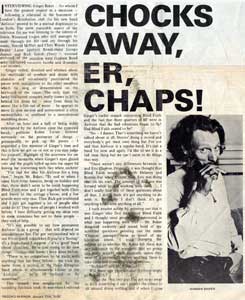
The most enjoyable aspect of the interview for me was listening to the talents of Stevie Winwood (organ who still manages to smile through his life and cry through his music, Harold McNair and Chris Woods (saxes) Denny Lame (guitar) Remikabaka (congo drurns and Rick Grech (bass -- excused rehearsal on this occasion were Graham Bond (alto) vocalist Jeanette Jacobs and drummer Phil Seamen.
Ginger rolled, thrashed and whisked about his multitude of cymbals and drums with abandon and occasionally punctuated the pieces with instructions to the other members which he sang or demonstrated on the keyboard or the organ.
The only time this lanky red-haired complex really comes to life is behind his drum kit away from them he seems like a fish out of water - he appears to move in slow motion and conversation is often monosyllabic or confined to a monotonous mumbling drone.
After an hour and a half of being richly entertained by the Airforce came the expected break, publicist Robin Turner hovered nervously on the perimeter of things — presumeably to pick up the pieces — requested a few minutes of Ginger’s time and this is how we got on or not as you may judge for yourself.
Highlight of the interview for me were the moments when Ginger’s eyes glazed over and the pupils rolled up into the upper lid leaving me conversing with two white sockets!
“I’ve had the idea for Airforce for a long time,” began Mr. Baker, “Er and er when I came back from Jamaica, being on holiday and that, there didn’t seem to be much happening Blind Faith-wise and I got together with Chris and Stevie at the cottage y’know, and a few sounds were very nice.
Then Rick got interested and I just got together a lot of people who could do it! They were all people I worked with before. I have difficulty getting my ideas over to some musicians but not to these people they sort of help.
“It’s not possible to say how permanent Airforce is as a group — that will depend on circumstances but I’ve got very involved wiv it cos it’s so good. (chuckles) If you’re a ‘hooray’ it’s a Super-band I suppose — it’s a ‘good’ band (more chuckles).
We’re just trying to do new things — things that haven’t been done before.
“There is no comparison to be made with anything that has been before - we took the name from a section of the Duke Ellington band which is affectionately known as the ‘Airforce’ we’re all inclined to fly sometime!”
This remark was emphasised by the vanishing eye-balls trick. It was when I referred Ginger’s earlier remark concerning Blind Faith and the fact that three quarters of BF were in Airforce that the bad vibrations began to fly!
Had Blind Faith ceased to be?
“No — I dunno. That’s something we haven’t talked about at all. Stevies’ doing a record and everybody’s got their own thing but I’ve not said that Airforee is a regular band. It’s just a band for now and again. I’d like to see it as a full time thing but we can’t seem to do things that way.
“There weren’t any differences between us and Eric Clapton. Originally it was thought that Blind Faith would tour with Delaney and Bonnie but when I came back Eric was doing that on his own. The concept of Airforce was formed while he’ working with them... I don’t really like any of these questions about all that. I don't think it's got anything to do with anything at all.”
I took evasive action by pointing out that it was Ginger who first mentioned Blind Faith and I thought most people were interested in what was happening with that - Mr. Baker disagreed violently and seized hold of my scribbled questions pointing out the name 'Clapton’ amongst them as proof of my felonious intent.
I tried changing the subject as to whether Mr. Baker felt there was any substance to the argument that no group can really achive much musically unless they were of a permanent nature enabling them to take roots and form thier own identities.
"Bullshit!" said Mr. Baker.
Was there any prospect that Airforce might go to the U.S.?
"After the first two gigs I've got to go away to do something. I can’t expect the others to sit around doing nothing and if when I come back they are involved in something else - that's the way it goes."
What was it which was taking Ginger away - the projected film role?
"Film - yeah."
What exactly will Ginger be doing in the film?
"God knows - I'm supposed to be acting."
(Chuckle).
Have they given him a script?
"Oh yeah!"
What kind of character is it?
"A gunfighter (chuckles) y'know!"
It sounds as if Ginger was not treating the excercise too seriously?
“Right” (chuckles) I’ll try anything once.
"People kept getting on to me to try it. I read the story and I dunno whether it’s a good story or not — I don’t have to say too much. I’m not the star by any means. I don’t appear till halfway through then I finish up by being killed!
Who else is in the film?
“I dunno”.
Where is it being shot?
“Mexico.”
Does Mr. Baker see any significance in trend towards bigger bands?
“To an extent we’re just doing what I've been doing for years. I played in an octet years ago in which we played what we thought was jazz and I’ve been playing the same thing ever since through the Cream, Blind Faith and Alexis Korner. People like what we play which good because if the people didn’t like what we played there would be no sense in playing it - what were we talking about?
"... You can’t go on doing the same thing for ever. Good Lord! I just thought it would be nice to work with all my old friends.
“I may not make much money out of it but that’s not what it’s all about. It’s the music that is the thing. Obviously I’m going to charge a lot of money for it.”
Why was the group’s Dutch debut cancelled?
"Bread!” said Ginger and the eyes disappeared once more.
Was Ginger overwhelmed by the fact the Albert Hall concert was sold out before anyone had even heard the group?
“If I saw a group with those names in it - quite apart from mine - I’d think Jesus Christ I must hear that.”
End of interview and just time for Robin Turner to make a profound remark about managers no longer managing musicians but musicians now managing their managers.
Ginger disconsolately kicked a drum about the floor.
“I can’t put myself in someone elses shoes," he grumbled. I went to shake hands — it was at least a good clean fight - Ginger kept his by his side. I shook a limp wrist.
“Yeah,” said Ginger.
“Yeah” Keith Altham.
GINGER'S AIR FORCE ZOOM TO A MILLION
by JACK BENTLEY
If the break-up of the Beatles is causing you concern about the future of British pop exports — forget it.
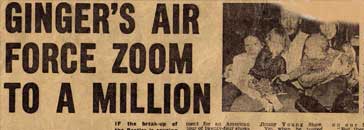
American Impresarios have just advanced half a million dollars to our newest beat group, Ginger Bakers Air Force, without even hearing an advance disc or concert.
The money is part payment for an American tour of twenty-four shows starting in June. The final sum amounts to more than 1.000.000 dollars (over £400.000).
This was no hasty gamble. For here is a twelve-piece super group composed of potential bandleaders and led by a man who has just been voted the world's best drummer in a US national poll.
Ginger Baker, 30, is a name that is seldom tossed around on the Jimmy Young Show. Yet when he toured America with The Cream and Blind Faith he received the kind of fan worship that wouldn't have disappointed Tom Jones. Both these groups sold discs by the million. It's not only the Americans who are quick to latch on to Ginger and Co. as successors to the Beatles.
Last night the Air Force were picked to top this year’s final pop prom at London’s Round House. Ginger was at London’s pop mecca, the Revolution Club, waiting to rehearse what he calls “his bunch of loons.” when he told me:
"The fans have suddenly tumbled to the fact that any group I’m connected with is composed of real musicians—fellows who play their Instruments like top professionals. Thats our gimmick.
"John and Paul had great talent for writing songs but the Beatles were never great musicians. Nor the Stones.
“It has taken a long time to get together a bunch of first-class musicians who think alike.
“Most of them are making big financial sacrifices at the moment. Our organist, Graham Bond, is even disbanding his group, Initiation, to join us.
"Another reason people seem to dig our sound is that I let all the group have a go at writing music. More than half of them have numbers on our first LP.
“But there is a good dividend in return. I have made the band co-operative so that everybody gets a fair percentage.
“We have a vocal group in place of a brass section—two girls making like trumpets and two men like trombones.
“Every Instrument is amplified but this doesn’t mean blasted ear drums. Volume can be reduced as easily as it can be turned up.”
Reason
Ginger first played trumpet with the RAF Cadet Corps and then built a drum kit out of plastic. He practised up to ten hours a day.
His great passion is his new 150 mph Jensen FF sports car.
"That’s one reason why I’m goin to America by boat," he said. “I want to take it with me.
“Besides, I’ve flown so many thousands of miles that maybe the law of aveages is against me now.”
Next week the Air Force tour Scotland and the North, and Ginger will make it in his Jensen.
“That reminds me,” he said. “I must send your article over to America because some fans will want convincing I’m still alive. It has just been announced over there for the fifth time- that I’ve been killed in a car crash."
When I left Mr. Baker I think he was considering doing next week’s tour by canal barge.
Portrait of a man making a million and happy to talk about:
GINGER'S BREAD by Jack Tinker
GINGER BAKER put the fat brown wage envelope close to his ear and rattled it with scowling suspicion. “There should be two-and-tuppence in change,” he said.
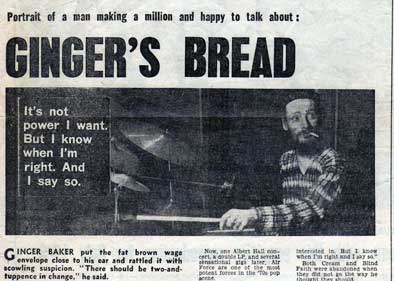
There was. So when he goes on to tell you that he knows to the last penny just how his fortune stands, you believe him implicitly.
At the age of 31 he Is a millionaire. On paper anyway. Which, if nothing else, puts him in a class of his own among the world’s greatest drummers.
However With the red haired Mr. Baker, there is plenty else.
Wild
He has to be both seen and heard to be believed. His music is as wild, compulsive, complex yet strangely disciplined as his life-style.
Stories about his prowess behind the drums rival those of his magic touch with money. How, at one recording session, in the middle of an Intricate drum solo, he aimed one of his sticks with deadly accuracy at an offending group member, and carried on p1ayng without dropping a beat.
Ginger has been hotly tipped to win next week's Melody Maker poll for the drummer of the year.
It has been a long and spectacularly colourful haul to the top for the Lewisham boy who had set his heart on becoming a racing cyclist.
“I gave up when my bike got smashed in an accident and I found I could play the drums better than I could pedal,” he says.
After that major decision there followed 16 years of unstately progress. From the old trad bands up through the super-star groups of Cream and Blind Faith, to Air Force, the group of “guys I like playing with and know can play.”
Now, one Albert Hall concert, a double LP, and several sensational gigs later, AirForce are one of the most potent forces in the ‘70s pop scene.
Air Force were Just winding up a long and steamy recording session. Outside the Barnes studios, Ginger’s low gleaming steel-blue Jensen spread its £6,000 length along an impressive stretch of kerb.
This and an imposing house in the poshest part of Harrow’s very straight stockbroker belt, are the only outward concessions he makes to the conventional millionaire image.
Vivid
So far no one had felt the wrong edge of his drum-sticks. But as he fired off a battery of complicated directions in a voice punctuated by vivid expletives, there was no mistaking who was boss around here.
“I’ve had all your committee-run groups with everyone having a vote what happens,” he says in language which has to be diligently pruned for print purposes.“It’s not power I’m interested in. But I know when I'm right and I say so.”
Both Cream and Blind Faith were abandoned when they did not go the way he thought they should. “Ever since we made it big with Cream I have invested my bread well.”
The bread gets buttered better and the butter spread further each year. Nigeria is the current focal point for his investment. He is hoping to set up a home there.
“I’m not a capitalist. No one needs more than enough to see their wife and kids right for life.” Ginger reckons that his wife Liz and his three young children, Ginette Karen (nine), Leda Kirsten (two and a halt), and Kofi Streatfield (one and a bit), are now in that happy position.
“So I spread the bread around a bit,” he says. Suddenly it was time for his group’s pay-out. “I’ve not paid them all they've earned. I’ve kept a bit back. They’ll only blow it all in one go and they’ll be glad of this later. You know what it’s like.
Ginger Baker does understand money as well as he understands music.
Press 1969
FAREWELL SHOW SADDENED THE CREAM
by NICK LOGANThe deification of the Cream was completed at the Royal Albert Hall around 11 o’clock on Tuesday of last week when the pulse of the last of their two encores melted into the tumult and applause and when the last clap and the final heartfelt plea of "God Save The Cream” had faded away into an atmosphere of high emotion.
Five thousand united voices hit a cry of rapture and a shower of confetti launched from the front row cascaded over Eric Claptpn’s bowed head.
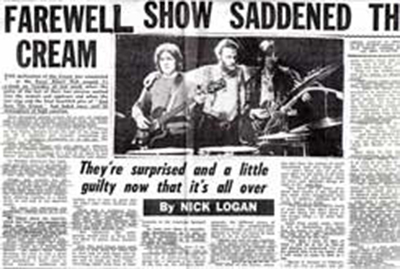
An ecstatic fan who had prepared himself all evening for this chance charged across the side of the stage and ran off in jubilation and triumph, brandishing his “spoils ‘ — Ginger’s drumsticks — in the air. The Cream was all over.
Jack, Eric and Ginger will rise again in different guises, in different spheres, but Tuesday night's farewell performance put the Cream as a unit in its place in pop history alongside Haley, the Beatles, Presley and others.
On Monday afternoon this week, Jack and Eric were to be found at the IBC Studios near Radio Onederland in Portland Place where I was told, they were recording.
Ginger was notable for his absence and so too was any semblance of work when I arrived to find Jack, Eric and their American record producer Felic Pappallardi chatting together in a small circle at one end of the deserted studio.
“We were just discussing our breakfast", offered Eric as a welcome.
We talked about the concerts, which had been a sad occasion for them also and Jack confessed: "I was really depressed for two or three days atterwards. It was quite moving; I just didn’t expect it."
Eriç who was wearing a magnificent crochet coat of many colours made by a loving fan, agreed. "We didn't really expect anything like that. It was a great reception, as good as any we have had anywhere. I don’t want to knock American audiences but quality wise it was as good and we didn’t play many encores over there.”
There was a summons from above for Jack to take a phone call and Eric continued: "The first show was sad because we knew it would have to be kept short and that inhibits you.
“But otherwise the other groups would have to have been Cut down to about three minutes each.”
Jack, Eric and Ginger have each written a new song for what will be their last LP and those will be recorded in the studio. The remainder will be made up from “live” recordings taken from four of their concerts in the American farewell tour.
As even now there is considerable bewilderment as to why a split is necessary I asked Eric to put the reason in as concise a form as possible. His answer, I think sums it up:
“It is like the Cream was a concensus or what we thought we could do as individuals within a group but — because of the nature of the line up, the diffent backgrounds, the different points of reference — the conglomeration that resulted was such a vast compromise to what we would all have liked to do as individuals.
"Maybe we will all get together to play again some time in the future and there is no reason why we should not appear on each other’s records, though it would be a big publicised thing if we did so."
And what of the future, which has also been the subject of much speculation and very little fact.
“I don’t think any of us are sure what we are going to do from this. There are just certain ideas we have, just idealistic things we want to do,” said Eric.
“But there are so many pressures that maybe it has made all this seem more exaggerated than it is. In essence, perhaps all we really need is a break.
“This business devours so much of your time. You don’t know if you are doing the right thing or the wrong thing — or even who you are!”
Apart from studio work, which is not so demanding, Eric feels that he wants to have a rest for as long as he can, perticularly from working on the road.
“This time I have no idea of what I will do as far as line-up and playing is concerned. I’ve got the sound; that is in my head. And I will work as close to that as I can.
“Maybe in January or February I will go into a studio and get some peopl ethere and try some things out it will very much be a trial and error thing."
What of the widely held belief that Eric wants to return to to the blues?
"The Cream never really played that much blues,” he answered.
"I think We aimed to start a revolution in musical thought. We set out to change the world, to upset people and shock then. At the start we were going I play Elvis Pressley numbers — but what happened was that we fell into doing these long instrumental pieces. Really the Cream was just an instrumental group.
"When I play on my own it includes various blues figure twelve bar things, Chuck Berry... and loosley around that. The sound will be bluesy, but I am not going to swtart playing "Dust my broom," or things like that."
How does he feel about the intellectualising of the Cream?
"It doesn’t matter how you do it as long as you like it. Some the lyrics we write might not mean anything to anyone else... but it’s all above my head becausc I never thought we were good as they thought we were.
"The public appreciation always surprised me because I never thought we really got it together to deserve that much acclaim," he concluded with remarkable honesty.
Last time I saw Jack he told me that the Cream had really reached its peak while on the last but one tour of the State and it was sad that the British audiences had not had a chance to see them at their height.
At the two Albert Hall concerts 10.000 were witness to the peak they have reached while thousands more were unable to get in — an ironically it was their last performance.
Yes I do feel rather guilty about that — I must admit’ said Eric, whose breakfast arrived at that minute. And I left him eating his cornflakes.
Preview & profiles
BLIND FAITH
Some groups develop stars, while some stars get together and burgeon into supergroups. One such group is Blind Faith, whose members consist of four of the most exciting musicians around today.
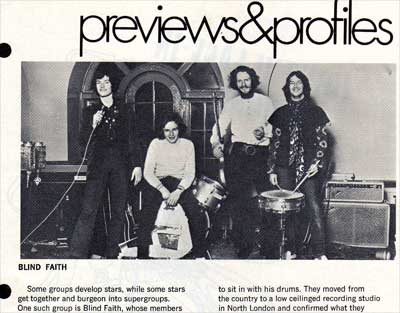
Not that the group (supergroup please) was a conscious decision; it was rather the drifting together of old friends discovering that time and the opportunity were both right. To the rock fan it would seem entirely natural that Eric Clapton, Steve Winwood, Ginger Baker and Rick Grech should be playing together.
The description “supergroup” was coined before there was anyone to fit it. And by the time there was, it had passed into disrepute, tagged on to any bunch of musicians garnered from an assortment of bands.
The pity of it is that in Blind Faith there is at last a group to restore the lustre of the title. A true meeting of four of the world’s most exciting musicians.
The idea was born in the enthusiasm of Eric Clapton and Steve Winwood to get together in a recording studio. It was nurtured in the leisurely jams at Eric’s country home or at the whitewashed cottage on the Berkshire Downs where Steve retreats whenever possible.
Ginger Baker, like former lead guitarist Eric Clapton, was restless with the lull Eric Clapton, was restless with the lull after the storm of the Cream split, and began to sit in with his drums. They moved from the country to a low ceilinged recording studio in North London and confirmed what they already knew. It was very, very good.
But for Ginger and Eric, with fresh memories of the break-up of the hugely successful Cream, it was still the triangle that they had found unworkable.
The answer was Rick Grech. The electric bassist whose work with an electrified violin had established him in the upper flights of British musicians gave the added depth, and meant that it was no longer a struggle to fill the gaps left by a trio; there was time to lay back and let the ideas flow.
After two months of playing together daily, Blind Faith made their public debut in London’s Hyde Park on June 7th, playing a Free Concert for an audience travelling by car, coach and rail from all parts of Britain, from the Continent, Scandinavia and even from behind the Iron Curtain. A reported crowd of over 100,000 people attended.
The London press covered the event. The Daily Mirror called it, “one of the most remarkable and amiable gatherings of young people ever seen in this country.”
The London Evening News reported it as “the farewell Cream concert.” Huh? At any rate, Blind faith has just completed their first tour of the U.S. Their album is on Atlantic.
Following Blind Faith to the shores of a lake
Chris Welsh reports on Saturdays's free concert in Hyde Park
BLIND FAITH lead 150,000 to the shores of a lake and lo — they experienced a revelation, and even the scribes of the land noted it and said it was good. And the scribes aren’t usually too hot on pop revelations.

There was something intensely Biblical about the unique free concert given by the new supergroup and friends in London’s Hyde Park on Saturday.
Even if God wasn’t an astronaut, he might well have played guitar, because it seems a powerful instrument to obtain due reverence.
The spectacle of thousands of people sitting on the grass, packed tightly together and simply listening to music in silence was quite uplifting.
Peace
“Bet the ‘papers don’t write anything about this — there’s been no trouble,” it was said at the end of the afternoon of peace, music and sunshine.
But the Sunday Mirror, and several other national newspapers noted how well the concert had gone and the Daily Mirror In a leader article stated: “There are not many countries where more than 100,000 youngsters could get together so peacefully and give the police no real worries let’s spotlight (and applaud) one of the most remarkable and amiable gatherings of young people ever seen In this country.”
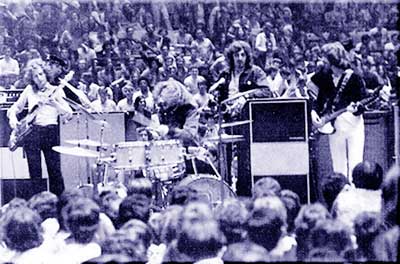
Fans even came from America to see the first appearance together of Stevie Winwood, Eric Clapton, Ginger Baker and Rick Grech. There were 7,000 in the park at 9 am having slept all night, and then by 2.30 pm when the Third Ear Band began to play, the entire Cockpit area was surrounded.
TALKING DRUMS
with Blind Faith's GINGER BAKER by Chris Welch
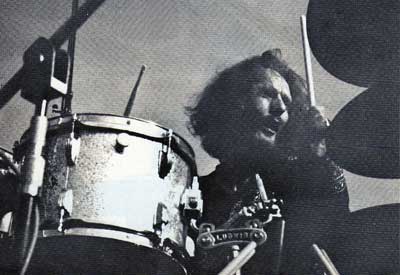
THERE was once a standard press picture caption for lady show business celebrities which ran: “Always happiest when among her flowers.”
Ginger has a reputation as a hell raiser, which he does not particularly enjoy and is not particularly accurate.
With angular features and wild red hair, he seems a fearsome figure as he nightly whips up excitement with drum solos on riot-torn rostrums across America.
He is known to get into occasional scrapes with policemen and has been seen at the centre of odd scenes in the more rocking kind of night club.
But Ginger Baker at home, when he gets the chance, is a man of peace, dedicated to ensuring his tropical fish receive a balanced diet and a clean environment.
Reward
He has worked long and hard for recognition and financial reward and even now he rarely has time to relax with the simple pleasures of life in a detached Harrow villa with wife and children.
However, Ginger managed to take a few days off from Blind Faith’s hectic tour of America last week and when I called at his home he was busying himself drawing plans for a proposed high speed cruiser while his family watched unmoved at the desperate attempts of the Rowan and Martin Laugh-In to raise a chuckle, in colour.
In just over a year in their comfortable and spacious house Ginger has ordered the transformation of his garden from a heap of wet clay to a pleasant piece of greenery with an attractive fish pond with fountains which he built himself with the aid of road manager, Mick Turner.
And inside Ginger has two large tanks stocked with an intriguing array of fishy delights of various hues.
I arrived at feeding time and was shown the outdoor pool in full operational order with concealed lighting and enough fountains and waterfalls to whip up the pool into a maelstrom.
"The fish love it," said Ginger with satisfaction, as great finny lumps huddled in what seemed to me cowardly fashion beneath the foam. We adjourned for a chat in the dining room.
"I’m going back tomorrow,” he revealed. “I just came back to see my family. The tour has been quite happy. After the Cream tours we altered it this time so we could get time off and drive ourselves to gigs.
Finish
"I did about 1,700 miles in three days last week. We’ve been doing all concerts and we finish on August 24 in Hawaii. The kids have been reacting pretty well. A few people weren’t too satisfied. Some people wanted Cream and didn’t get it.”
Did Ginger think Blind Faith was a better band than Cream?
"It’s a different band. Things have been getting better all the while. I’m playing well lately. I do a solo every night — I don’t think I could work without doing that.
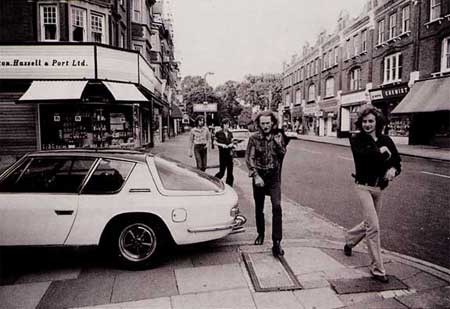
"The kids all want that, so I usually end up doing one. I need a number to build up excitement to play a solo and we do it on ‘Do What You Like.
“There have been a few reports that Blind Faith is Stevies band. Well thats bull. I saw one review of our record which said it was Stevie’s new band which is a bit puzzling because it’s nobody’s band.”
I mentioned to Ginger that I had been recently replaying his original recording with Graham Bond, Jack Bruce and Dick Heckstall-Smith, the original super group.
“I don’t really play anything. I just don’t play records too much. You do a record and become very involved in it at the time, then you move on.
"Sometimes I play a Cream record. Some good records came out of that. Really, when I’m not playing, I’m not musically conscious. I like to get away from it all. That’s why I like having a car.
Idea
“I’d still very much like to do an LP with Phil Seamen. Work with a big band? Yeah, that’s a nice idea. I’m not dead yet — there’s some life in me yet. Possibly some things like that will happen.
“There’s still a lot of things I’d like to do with Blind Faith. There’s a lot of tunes I’d like us to do. The band didn’t really get together at first.
When we did Hyde Park I wasnt happy with my solo and Eric didnt get it together too well which is unusual for Eric. But since then hems got better and better. The first gig where it really started to happen was in Oslo.”
Wares
His solo on the new Blind Faith album struck me as sounding African influenced, with slack-tuned torn toms thudding in waves.
"I’ve always been interested in African drumming. Nobody can play drums without being interested. Indian drumming is technically incredible but African drumming is more into feel and time.
"Indian drumming is also into time of course, but with African drumming you get an incredible feel. It often sounds simple, but try and spot where the the beat lies.
"Phil Seamen used to play me an African record and he’d say: "Right, where is it?" Sometimes I was right, but quite often I was wrong, and he’d laugh and tell me to have another listen.
"I first met Phil in 1960 or ‘61. I was playing in the Flamingo with Alan Branscombe. He used to be pianist with Johnny Dankworth. I went for the Dankworth job when Kenny Clare left — and didn’t get it.
"Anyway, Phil was playing in Ronnie’s in Gerrard street, and Tubby Hayes told Phil to come in and watch me. I’d always dug Phil ever since forever, but I had never gone in for speaking to people I didn’t really know. I can’t stand it myself when people come up and say, ‘hello, I’m a drummer.’ I tend to say — so what?
“But Mr. Seamen came over to say hello and we’ve been close friends ever since. In talking and playing together he saved me years.”
Did Ginger ever regret not getting further into jazz and concentrating on guitar groups?
“I was always called a rock and roller in the days of jazz. For me, jazz has stagnated since Parker and Gillespie. There’s nothing happening in it now for me.
“But I saw Max Roach with Elvin Jones and Art Blakey recently and he played the b...s off both of ‘em. Max is incredible.
Aware
"But I think what we’re doing in Blind Faith is jazz. Jazz was always the peoples music — whatever the kids who are aware like. They know what’s happening.
“The kind of jazz you get in clubs now is purely musicians’ music. If you’ve got a technique it’s easy to play fast. But if you play slower tempos and play something good, the majority of people can dig it and you can communicate with your audience.
“Simplicity is really beautiful. That’s the whole thing with me — to communicate with the audience.”
“Nobody is above criticism,least of all me. I take a lot of criticism... you get bad reviews and you get hung up about it. I’ve had quite a lot recently. But I criticise myself. You go through stages of thinking you are great.
“There are a couple of things on the 'live’ solo on the last Cream album I was trying to get off, and it’s nice that I am playing them now. It’s a thing that
involves playing triples with two feet and the left hand and rolling the cymbals.
Simple
It’s quite simple actually, but it’s nice to be able to go straight into it.
The trouble is when you are playing to an audience, they don’t want to hear you practising.
"The success of a solo depends on circumstances — how I feel and the mood of the audience. I rely a hell of a lot on audience reaction. I always work hard at it, but sometimes I get annoyed at myself.”
After 15 years as a pro musician and being associated with something like eight million dollars worth of record sales, Ginger still takes a pride in his work and maintains a desire for progress.
He never was a predictable musician, and never will be. His greatness is as an original player.